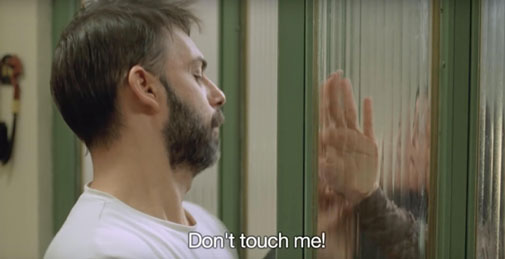Michael Cusumano back again with my new series on great scenes/films of the 21st Century. This week a title we will surely hear often when the best of the decade lists start rolling in...

Scene: Razieh is Fired (aka The Incident)
It’s rare for a movie, even a great movie, to sneak up on the audience the way Asghar Farhadi’s A Separation does.
The screenplay is centered around an inflection point. Everything pulling the characters inexorably toward, or ricocheting off of, the moment when a man shoves a woman out his front door. Yet this action is not granted any special emphasis. First-time viewers have no clue they’ve witnessed the action around which the entire story pivots. It is only a few short scenes later, when the man is on trial for causing the miscarriage of the women he pushed (a murder charge in Iran) that the weight of that shove comes crashing home...
We interrogate our memory of the scene. The film’s opening shot puts us in the point of view of a judge and Farhadi keeps us there throughout the film, continually weighing the evidence. Yet even with the expansive point-of-view granted by the screenplay, certainty remains elusive.
How sure are we of what we saw? We don’t remember the push being all that serious but did we get a good look? Was it more of a nudge or a shove? Or was it a hit as the woman’s hot-headed husband later upgrades it. When years in prison are on the line, these distinctions suddenly matter a great deal.
Much hangs on the question of whether Nader (Peyman Moaadi), the shover, knew she was pregnant at the time. Again we search our memories. Her condition was openly discussed but where was Nader during the discussion? Were we able to tell she was pregnant before we were told? Reenactments are staged. Witnesses attempt to add clarity (while pressing their thumb on the scale whenever possible). I am reminded of Sidney Lumet’s 12 Angry Men, which begins with a damning set of facts in a murder case and gradually shows how each one falters under scrutiny. If anything A Separation is the more impressive accomplishment since the crime in Lumet’s film only exists in the mental images created through dialogue, whereas Farhadi holds onto to ambiguity despite giving the audience a clear shot of every step, no cheating. Where to begin praising the skill required to make events unfold with the naturalism of life itself while at the same time maintaining a level of control over the viewer’s focus that would make Hitchcock proud.
The truth begins to grudgingly reveal itself but the question of blame remains hazy. Yes, Nader is justified in firing Razieh when he returns home to find his elderly, Alzheimer’s afflicted father on the floor, unconscious, with his wrist tied to the bed, while Razieh (Sarieh Bayet), the old man’s caretaker, is nowhere to be found. But did Nader unwittingly create a situation in which she couldn’t help but be overwhelmed? Yes, Razieh shouldn’t have kept the job a secret from her husband, but her religion prohibits her from taking a job where she’d be alone in the house with men, and they desperately needed the money. Nader doesn’t seem criminally out of line giving Razieh a slight push when she refuses to exit his doorway, but of course she wouldn’t be so upset if in his anger he hadn’t baselessly accused her of theft. And on and on and on.

Everyone in the film sees themselves as a good person doing the best they can against difficult circumstances. They feel justified when they refuse to compromise, tell white lies, cut corners. A Separation accumulates these small transgressions, noting everyone’s reasons, keeping a neutral eye, until we recognize any attempt to isolate one action from all that context is practically meaningless. And always there are questions of religion and class, hovering around the edges of the frame, addressed only indirectly but feeding resentment and informing the limits of everyone’s choices.
A Separation makes it message unmissable without ever having to spell it out. The film draws no dramatic distinction between big and small events because they all matter. If one of the characters had, at any point, looked past their own justifications and acted with empathy, generosity or understanding so much pain could’ve have been avoided. We watch the film and look at our own lives and think how comically limited is our own perspective.
“My finding is that your problem is a small problem” the judge tells Nader and his wife Simin (Leila Hatami) after they describe the impasse that is ending their marriage in the film’s opening scene. It is the story in microcosm - a series of small issues building up to an avoidable tragedy. Simin is incredulous at the judge's dismissive conclusion. As with everything in the film, we can see both viewpoints.

Previously on The New Classics:
- A terrifying man pauses for reflection
- Naked desperated violence in an all-time great fight scene
- A villain collapses in one of the great comeuppances